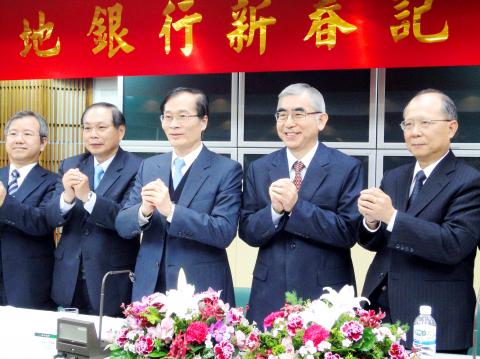Land Bank of Taiwan (土地銀行), the nation’s largest property lender, is cautious about its growth outlook this year, having seen only one major land financing application so far this year, bank chairman Wang Yao-shing (王耀興) said yesterday.
The state-owned bank aims to step up its corporate banking business this year to help mitigate the impact of falling loan demand as a result of the government’s effort to rein in property prices, Wang said.
“It is unlikely that Land Bank will see earnings grow this year” after pre-tax income rose to a new high last year on the back of robust commercial property trading, Wang told a media briefing.

Photo: CNA
The number of land financing loans has shrunk by 20 percent so far this year, with only one valued at more than NT$50 million (US$1.69 million), suggesting that the housing supply may take a dive in the coming two to three years if the situation persists, Wang said.
Government policies that are unfavorable to the housing sector have dampened investment interest, Wang said, adding that he still had not seen any concrete signs of a price correction.
“It is better for the bank to adopt a cautious approach and step up risk control this year” as the European debt crisis will continue to weigh on the economy at home and abroad, he said.
Toward that end, Land Bank staff members have visited construction sites nationwide to monitor business flows, Wang said.
The lender’s land and construction loans totaled NT$283.67 billion at the end of December, rising 17.43 percent from a year earlier and outpacing its peers with a market share of 21 percent, company data showed.
“Once property auction results are out, our employees are on the spot to offer financing applications,” Wang said.
Land Bank, which is not listed on the local bourse, reported NT$10.53 billion in pre-tax income last year, 31 percent higher than its target, the chairman said. He expects earnings to drop below NT$10 billion this year.
The lender processed 363 land and construction financing applications last year, with the number falling each quarter, from 123 in the first three months to 69 in the fourth quarter, said Chang Tang-fong (張堂豐), general manager of the credit management department.
The number of large-scale land financing cases plummeted to 20 last year, from 40 a year earlier, company data showed.
Land Bank plans to increase lending to companies to help offset sluggish demand from developers and construction firms, Wang said.
The lender also aims to further tap the Chinese market by opening its second branch in Tianjin this year, after setting up a branch in Shanghai last year, Wang said.

IN THE AIR: While most companies said they were committed to North American operations, some added that production and costs would depend on the outcome of a US trade probe Leading local contract electronics makers Wistron Corp (緯創), Quanta Computer Inc (廣達), Inventec Corp (英業達) and Compal Electronics Inc (仁寶) are to maintain their North American expansion plans, despite Washington’s 20 percent tariff on Taiwanese goods. Wistron said it has long maintained a presence in the US, while distributing production across Taiwan, North America, Southeast Asia and Europe. The company is in talks with customers to align capacity with their site preferences, a company official told the Taipei Times by telephone on Friday. The company is still in talks with clients over who would bear the tariff costs, with the outcome pending further

NEGOTIATIONS: Semiconductors play an outsized role in Taiwan’s industrial and economic development and are a major driver of the Taiwan-US trade imbalance With US President Donald Trump threatening to impose tariffs on semiconductors, Taiwan is expected to face a significant challenge, as information and communications technology (ICT) products account for more than 70 percent of its exports to the US, Chung-Hua Institution for Economic Research (CIER, 中華經濟研究院) president Lien Hsien-ming (連賢明) said on Friday. Compared with other countries, semiconductors play a disproportionately large role in Taiwan’s industrial and economic development, Lien said. As the sixth-largest contributor to the US trade deficit, Taiwan recorded a US$73.9 billion trade surplus with the US last year — up from US$47.8 billion in 2023 — driven by strong

A proposed 100 percent tariff on chip imports announced by US President Donald Trump could shift more of Taiwan’s semiconductor production overseas, a Taiwan Institute of Economic Research (TIER) researcher said yesterday. Trump’s tariff policy will accelerate the global semiconductor industry’s pace to establish roots in the US, leading to higher supply chain costs and ultimately raising prices of consumer electronics and creating uncertainty for future market demand, Arisa Liu (劉佩真) at the institute’s Taiwan Industry Economics Database said in a telephone interview. Trump’s move signals his intention to "restore the glory of the US semiconductor industry," Liu noted, saying that

AI: Softbank’s stake increases in Nvidia and TSMC reflect Masayoshi Son’s effort to gain a foothold in key nodes of the AI value chain, from chip design to data infrastructure Softbank Group Corp is building up stakes in Nvidia Corp and Taiwan Semiconductor Manufacturing Co (TSMC, 台積電), the latest reflection of founder Masayoshi Son’s focus on the tools and hardware underpinning artificial intelligence (AI). The Japanese technology investor raised its stake in Nvidia to about US$3 billion by the end of March, up from US$1 billion in the prior quarter, regulatory filings showed. It bought about US$330 million worth of TSMC shares and US$170 million in Oracle Corp, they showed. Softbank’s signature Vision Fund has also monetized almost US$2 billion of public and private assets in the first half of this year,